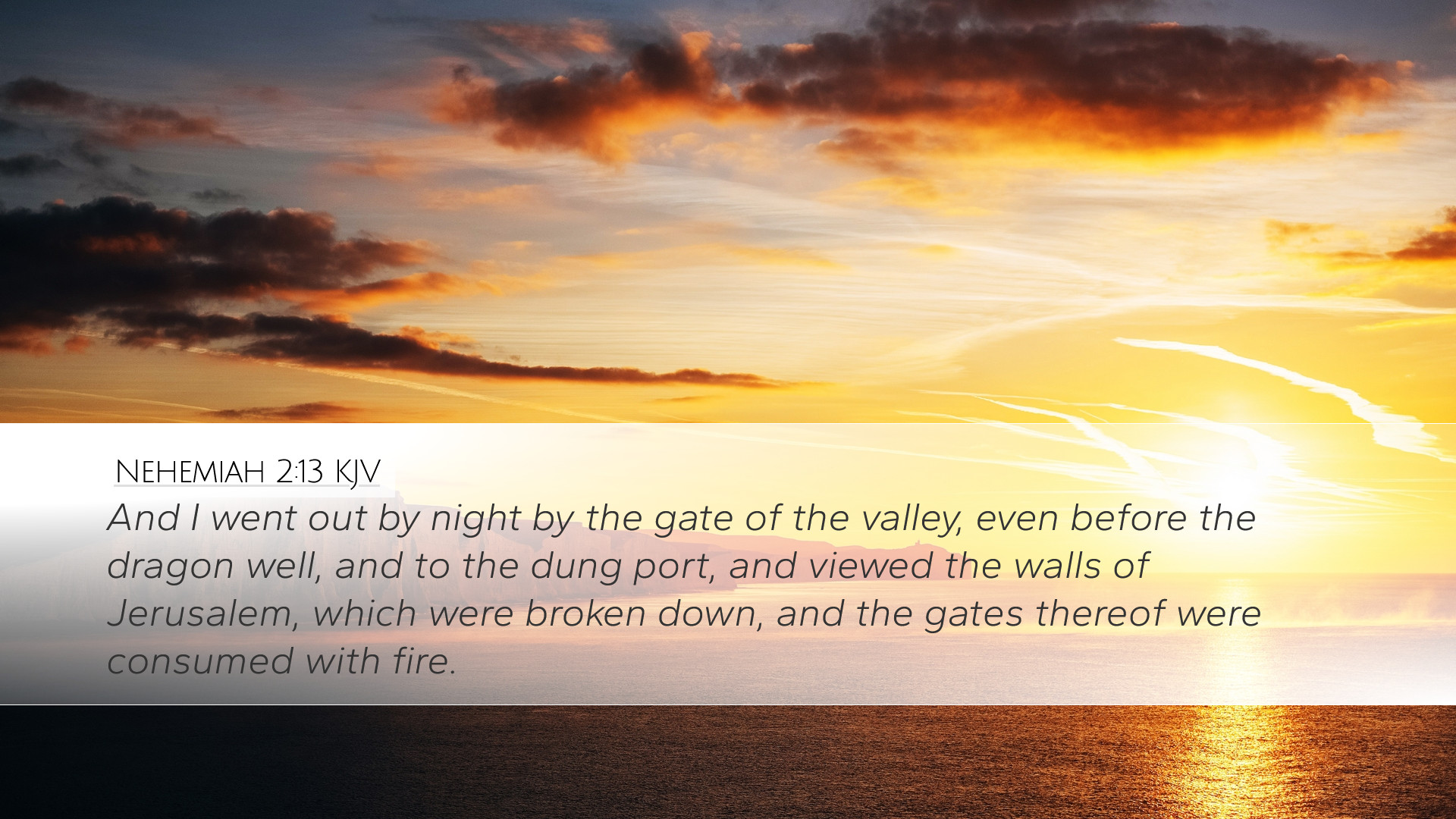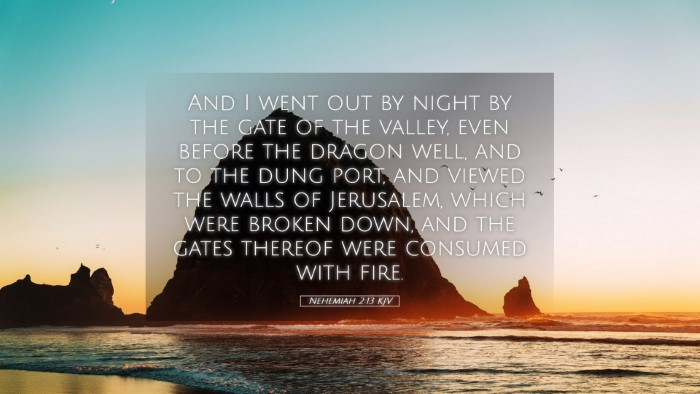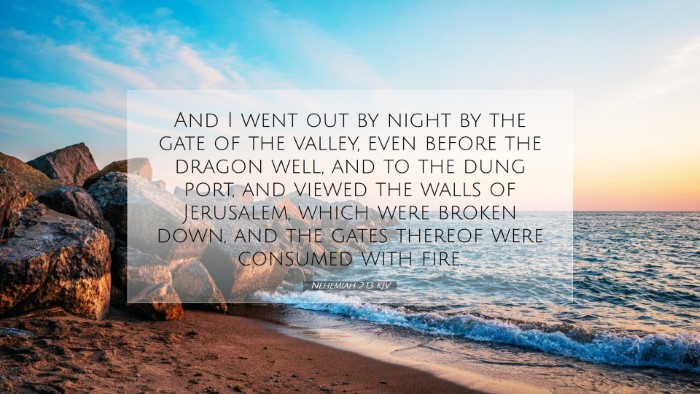Old Testament
Genesis Exodus Leviticus Numbers Deuteronomy Joshua Judges Ruth 1 Samuel 2 Samuel 1 Kings 2 Kings 1 Chronicles 2 Chronicles Ezra Nehemiah Esther Job Psalms Proverbs Ecclesiastes Song of Solomon Isaiah Jeremiah Lamentations Ezekiel Daniel Hosea Joel Amos Obadiah Jonah Micah Nahum Habakkuk Zephaniah Haggai Zechariah MalachiNehemiah 2:13
Nehemiah 2:13 KJV
And I went out by night by the gate of the valley, even before the dragon well, and to the dung port, and viewed the walls of Jerusalem, which were broken down, and the gates thereof were consumed with fire.
Nehemiah 2:13 Bible Commentary
Commentary on Nehemiah 2:13
Verse: Nehemiah 2:13 - "And I went out by night through the gate of the valley, even before the dragon well, and to the dung port, and viewed the walls of Jerusalem, which were broken down, and the gates thereof were consumed with fire."
Introduction
This verse occurs during a pivotal moment in the narrative of Nehemiah, who has been moved to return to Jerusalem to oversee the rebuilding of its walls and gates. This commentary draws from the insights of renowned public domain commentaries including those by Matthew Henry, Albert Barnes, and Adam Clarke, providing a holistic understanding suited for pastors, theologians, and students of the Word.
The Context of Nehemiah's Mission
Nehemiah, a cupbearer to King Artaxerxes of Persia, was burdened by the news of Jerusalem's desolation. His concern for his people and their city leads him to request permission from the king to return and rebuild the city. His mission illustrates the importance of leadership, compassion, and proactive engagement in the face of communal challenges.
Exploration of the Verse
Nehemiah's nocturnal journey serves multiple purposes:
- Discreet Observation: Nehemiah undertakes his survey by night to avoid drawing attention from those who might oppose his plans. As Adam Clarke notes, the night offers a time for quiet reflection and ensures the safety of Nehemiah and his mission. This action reflects wisdom and forethought.
- Genuine Assessment: By going out to view the walls and gates, Nehemiah aims to gather firsthand knowledge of the situation. Matthew Henry points out that a leader should assess the realities of their circumstances to plan effectively.
- Symbol of Restoration: The locations mentioned—valley gate, dragon well, and dung port—symbolize the brokenness of Jerusalem and the work that lies ahead. Albert Barnes highlights how these specific sites represent the extensive destruction that will require attention and restoration.
The Significance of the Locations
Nehemiah's path covered critical and symbolic areas:
- Valley Gate: This gate likely led out toward the valley, representing a point of vulnerability for the city. The brokenness here symbolizes the need for strength and security.
- Dragon Well: The reference to a well signifies the provision and sustenance needed for both the work and the people of Jerusalem. It underscores the dependency on God for spiritual and physical nourishment.
- Dung Port: As a location associated with refuse, the dung port is emblematic of neglect and decay. It serves as a brutal reminder of Jerusalem's dire state and the need for purification and restoration.
The Condition of the Wall and Gates
The imagery of walls broken down and gates consumed by fire is profound. These structural failures are not merely physical but also represent spiritual and communal decay. As Clarke notes, the walls symbolize security while the gates signify access and the ability to welcome God’s presence. The destruction reflects a people in need, both physically and spiritually, signaling a call to revival.
Nehemiah's Leadership Qualities
As we reflect on Nehemiah's actions:
- Visionary: He embodies the essence of visionary leadership, recognizing the condition of Jerusalem and feeling compelled to act.
- Persuasive: His ability to move from cupbearer to leader illustrates the potential influence one person can have, especially when driven by divine purpose.
- Strategic: Nehemiah’s choice to inspect the walls at night demonstrates prudence, illustrating the importance of assessment before taking action.
Application for Today
Nehemiah 2:13 serves as a reminder for contemporary leaders and believers about the necessity of taking initiative in the face of communal challenges. It encourages careful observation and assessment in difficult situations, as well as reliance on God’s provision. For pastors and theologians, it underscores the importance of both spiritual and community engagement, inspiring actionable faith that leads to reconstruction and revitalization.
Conclusion
Nehemiah’s nighttime journey through the devastated city is laden with lessons of faith, leadership, and hope. By examining the structural and spiritual devastation, he emerges as a catalyst for change. His actions remind us that being mindful of our context and engaged in restoration work is essential in advancing God’s Kingdom.


